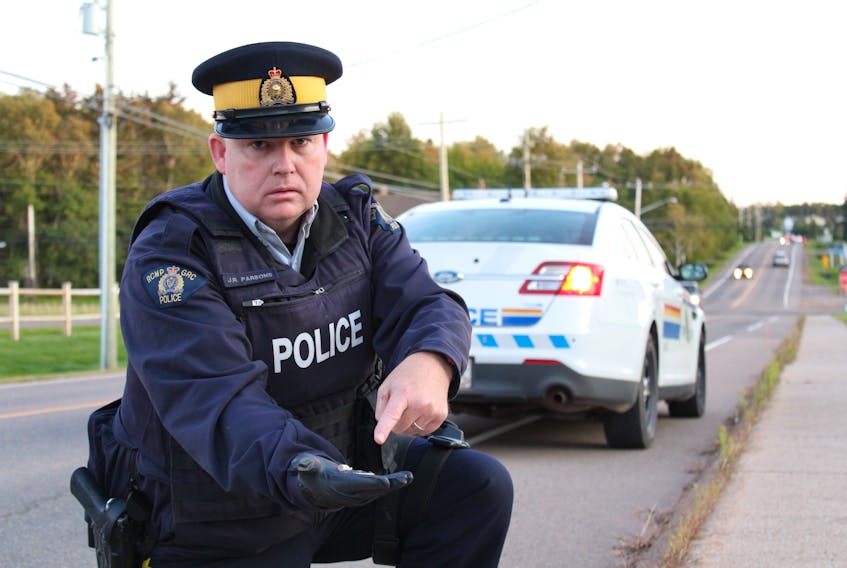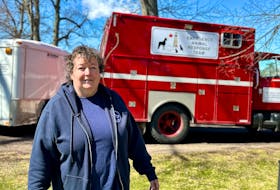STRATFORD, P.E.I. — When Jamie Parsons walks around his hometown, Stratford, he sees too many cigarette butts.
“I bet you can’t walk 100 metres without seeing one,” he said. “You go through Tim Hortons or McDonald’s or any drive thru, and you look down and you see numerous cigarette butts on the ground. Not only is it disgusting, it’s actually dangerous.”
The RCMP constable wants this littering to stop. Whether it be while walking along sidewalks or driving the roads, Islanders of legal smoking age are responsible to butt out properly, such as by using an ashtray, he said.
“They’re adults. They should make the conscious decision.”

Parsons spoke with his superiors at the Stratford RCMP dispatch and received support for his idea of making the town cigarette-butt free. That means Stratford police will up their enforcement of provincial litter laws if they see someone flicking a butt to the ground.
“We can do better and keep our communities cleaner and safer.”
Parsons plans to follow up on the idea this fall. He also plans to approach Stratford’s town council to get its support and perhaps their help with educating the public.
“Just to let them know that this is something we’re going to promote,” he said. “If we get the message out there that it’s not acceptable, maybe people will take the steps to safely discard their cigarette butts.”
Over the summer, he used the Island RCMP’s social media handles to speak out against cigarette littering, which officers can issue tickets for but aren’t always firm on.
“Cigarette butts are not biodegradable contrary to common belief,” one Twitter post read. “With two recent fires believed to be started by cigarette butts we ask motorists (to) butt out inside their vehicles.”
Cigarette butts are NOT biodegradable contrary to common belief. Why do people think it socially acceptable to throw cigarette butts out their windows? With two recent fires believed to be started by Cigarette Butts we ask motorists is butt out inside their vehicles. Cst. Parsons pic.twitter.com/1CEDPmpbi2
— RCMP PEI Traffic (@RCMPPEITraffic) August 9, 2019
The two referenced fires occurred last July, one destroying an apartment building in Charlottetown and another destroying part of a motel in Brackley Beach. Both fires originated from mulch gardens and are suspected to have been started by either a smoldering cigarette or a piece of glass.
“It’s something that can be stopped and prevented,” Parsons said.
Hazardous litter
Liz Spangler says cigarette butts can be a health and environmental hazard.
The vice-president of the P.E.I. Women’s Institute, which holds an annual roadside cleanup across P.E.I., says cigarette butts can take up to 10 years to decompose. As well, their filters are designed to protect people from its harmful toxins.
“So not only is it something that’s slow to degrade, but it absorbs all the toxins left from the cigarette and it’s left there," says Spangler, who also taught at the Atlantic Veterinary College with a focus on epidemiology.
A littered butt still contains much of those toxins, meaning they could seep into the ground or be washed into a stream, harming the environment around it, she said.
“It’s a biohazard. I mean that’s why it causes cancer.”
Spangler and the institute’s cleanup volunteers always find cigarette butts along P.E.I.’s roads. She thinks littering them is an unconscious decision for most people.
“Cigarette butts are the worst because they’re so small. In terms of people’s awareness,” she said. “(People) need to understand it doesn’t belong there.”
She lives on a rural, clay road in Hazel Grove, and she often sees people driving there and dumping their ashtrays on the roadside and sometimes in the nearby pond, she said.
She’d like to see more ashtrays or litter containers throughout cities, as well as campaigns to educate the public on this form of litter.
“Not to ban (smoking), but to inform people of the health hazards,” she said.

At a glance
How are cigarette butts being dealt with on the other side of Canada?
Jonathan McDermott, manager of solid waste programs with the City of Vancouver, said the B.C. city has about 1 million cigarette butts littered on its streets every day.
“Which is pretty crazy,” he said. “It’s just become a part of what society has deemed acceptable.”
This summer, the city officially launched the Pocket Ashtray Pilot program. They’ve distributed about 9,000 wallet-sized envelopes for free, which can be used to safely store cigarette butts until being properly disposed of.
The outer liner of the pocket ashtray is made of plastic, the inner liner is made of foil, and in between is a foam heat shield. While the use of plastic has been criticized, they can be cleaned and re-used, McDermott said.
“This is not intended as a single-use product.”
The idea is to enable people to properly dispose of their litter by putting the solution in their hands, he said.
“Having the smoker take the responsibility, rather than put it on everyone else.”
The program is part of a city strategy to educate Vancouver on litter in general. Outreach teams have spotted members of the public using the ashtrays, and the program has received almost exclusively positive feedback, he said.
RELATED









